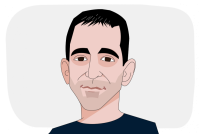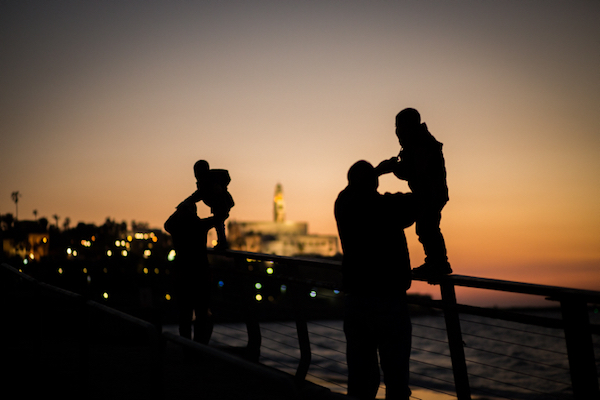When I first got the news that he had won, the first people I checked on were my Muslim mother and my son.
But then I wrote my friend, Brad Brooks-Rubin.
The connection wasn’t coincidental. When my son was born, Brad was the first to visit him. A year later, I bought a life-sized playhouse and leaned it against the plastic siding of our rented home, just outside of Washington, DC. When my son was skeptical about his new toy, Brad crawled in first, wedged his head through the tiny window, and looked my toddler dead in the eye.
“Listen, kid,” he said. “You’re Palestinian, I’m Jewish—do you understand how this looks?”
It was the kind of humor—about land appropriation, no less—that only a Palestinian and a Jew could get.
Over the course of our friendship, Brad and I have laughed a lot. But when I got in touch with him after the election, neither of us was in any mood to joke. I told him I was worried about my son. He told me he’d been setting his house alarm—because it helps his own son to sleep.
We are two fathers now, anxious about the future. And for the first time since I’ve known him, neither of us knows quite what to do about it.
It’s a disquieting feeling, perhaps especially for us. Even when we lost touch, for years at a time, Brad and I stayed connected by an extraordinary set of shared experiences. We travelled the West Bank together. We probed, through conversation and work, depths of anger and guilt. We tried to divvy the burdens of responsibility.
And as Americans, we pried protest from privilege, engaging the least pliable among us. We taught an evening class on “the conflict” at the DC Jewish Community Center. We attended service at a Conservative synagogue (where Brad wore his “End the Occupation” t-shirt).
And we shared a meal with my Palestinian mother. It was, as I recall, a hearty spread of stuffed zucchini and rolled vine leaves, recipes she brought with her from her native Bethlehem. She enjoyed the company, and when Brad left, my mother looked me dead in the eye and told me my friend was “a nice boy.”
And that she knew he was Jewish.
I’d like to think I didn’t need her permission. But the truth is, nothing about my upbringing made it easy to have a Jewish friend. It took my Muslim mother to remind me: what happened to her need not color the choices I make.
Now, I have more reminders—and fewer choices.
When I got the news about the “travel ban,” I thought again of my mother, who only recently naturalized. And then I heard that Brad and his wife had organized a visit for other Jewish families to their local Islamic center. That act, along with a recent Muslim-led initiative to repair vandalized Jewish cemeteries, reminded me of another conversation, this one with my Palestinian father.
It was the height of the First Intifada, and I remember watching him break down in tears almost every night. As the news cast scenes of young Palestinians facing off against the Israeli military, I could see anger behind his tears. And I wanted to get to the bottom of it.
“Baba,” I asked him, “do you hate Jews?”
I don’t know what I expected to hear, but his answer has stuck with me all these years. “Son, I don’t hate anybody,” he said. “I just have a hard time trusting sometimes.”
He had his reasons. But mine have been forged in different times. I recall, for example, how +972’s Noam Sheizaf and Edo Konrad—both Israeli—were the first to visit me after I left Gaza in the late summer of 2014. When they offered to host me at their homes in Tel Aviv, I declined, for reasons they understood implicitly. So they insisted on meeting me in East Jerusalem instead, where the sounds, at least, were Arabic, and the tea was strong and slowly steeped.
We may yet differ on the finer points of our inherited conflict, but Brad and I draw strength from the solidarity now binding our two communities. Though we brace for the storms America’s election has wrought, we hope that, one day—if we weather this cold front together—our children may know a more permanent calm.


